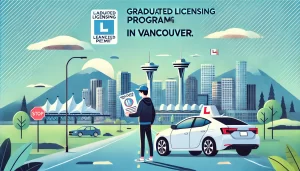As a new driver in Vancouver, you might be wondering why winter tires are such a big deal. Winter tires are specifically designed to perform better in cold, snowy, and icy conditions compared to all-season tires. They provide superior traction, handling, and safety features that are crucial for driving in challenging weather.
Why Winter Tires Are Important
Vancouver winters, while not as harsh as other parts of Canada, can still bring cold snaps, snowstorms, and icy roads—particularly in higher elevations or areas like the North Shore or Sea-to-Sky Highway. Winter tires help you navigate these conditions with greater control. They’re not just recommended—they’re often required in certain parts of British Columbia.
Winter Driving Challenges in Vancouver
Unlike cities that experience consistent winter weather, Vancouver’s climate fluctuates. You may encounter heavy rain one day and icy roads the next. This variability makes it even more critical to be prepared with the right tires, as conditions can change rapidly.
What Are Winter Tires?
Winter tires are made from a rubber compound that stays flexible in low temperatures, providing better grip on snow and ice. They also feature deeper treads with unique patterns designed to channel snow, slush, and water away from the tire’s surface, reducing the likelihood of slipping or hydroplaning.
How They Differ from All-Season Tires
While all-season tires are a popular choice, they aren’t optimized for cold conditions. Winter tires are designed specifically for temperatures below 7°C (44°F), where all-season tires can become stiff and lose traction.
Benefits of Winter Tires in Vancouver
Improved Traction on Snow and Ice
Winter tires provide enhanced traction due to their softer rubber composition and specialized tread patterns. This makes it easier to stop and start on snowy or icy surfaces, especially when compared to all-season tires.
Enhanced Braking Performance
In cold conditions, your ability to stop quickly is crucial. Winter tires significantly reduce stopping distances on both snow and ice, making them indispensable for winter driving.
Reduced Risk of Hydroplaning
Vancouver’s frequent rain combined with cold conditions often leads to slushy, wet roads. Winter tires have deeper treads and more intricate grooves to direct water away from the tire, helping to minimize the risk of hydroplaning.
Local Regulations for Winter Tires in Vancouver
Legal Requirements for Winter Tires
In British Columbia, winter tires or chains are required on many highways from October 1 to April 30. While Vancouver’s downtown core doesn’t mandate winter tires, they are strongly advised, particularly if you’re traveling to higher elevations like Whistler or the Coquihalla.
Penalties for Not Using Winter Tires
Failing to comply with winter tire regulations can lead to fines or being turned back at checkpoints, particularly on highways where winter tires are mandatory. As a new driver, it’s essential to familiarize yourself with these rules to avoid penalties and stay safe.
Choosing the Right Winter Tires
Tire Ratings and Symbols to Look For
Look for tires marked with the “three-peak mountain snowflake” symbol. This indicates that the tire meets the standards for severe snow performance. It’s essential to ensure that your tires have this certification when shopping for winter tires.
Studded vs Non-Studded Winter Tires
Studded tires offer extra grip on icy roads, but they are only permitted in certain areas and during specific times of the year. Non-studded winter tires are typically sufficient for Vancouver’s winter conditions and are less damaging to road surfaces.
When to Install Winter Tires
Ideal Timing for Installation
It’s best to install your winter tires when the temperature consistently falls below 7°C, usually around mid-October in Vancouver. This ensures you’re prepared for early winter weather.
Temperature Guidelines for Changing Tires
When the weather warms up in the spring and stays above 7°C, it’s time to switch back to your all-season or summer tires to avoid excessive wear on your winter tires.
Cost of Winter Tires
Average Prices of Winter Tires in Vancouver
The price of winter tires varies based on brand and size but typically ranges from $120 to $400 per tire. While this may seem costly, the safety and performance they offer during winter are worth the investment.
Cost Comparison: Winter Tires vs All-Season Tires
All-season tires might save you money upfront, but the additional safety and control offered by winter tires in cold conditions can prevent costly accidents or damage.
FAQs About Winter Tires for New Drivers
- Do I really need winter tires in Vancouver? Yes, especially if you plan on driving in areas where snow and ice are common or where winter tires are legally required.
- When should I switch to winter tires? You should switch to winter tires when the temperature consistently drops below 7°C, typically in mid-October.
- Can I use chains instead of winter tires? Chains can be used in some areas, but they are a short-term solution and aren’t as effective as winter tires for daily driving.
- Are winter tires expensive to maintain? Winter tires require proper storage during the off-season and regular checks, but with good care, they can last several winters.
- How do I know when to replace my winter tires? Check the tread depth. If it’s below 4/32″, it’s time to replace them.
- Where can I buy the best winter tires in Vancouver? Major retailers like Canadian Tire, Kal Tire, and Costco offer a wide selection of winter tires suitable for Vancouver’s conditions.
Conclusion Equipping your vehicle with winter tires is one of the most important steps you can take to ensure your safety on Vancouver’s roads this winter. With the right tires, you’ll have the confidence and control you need to face the city’s unpredictable winter condition
For driving classes in Vancouver contact and follow Seymour Driving School, with us you’ll be on your way to driving independently and confidently.





